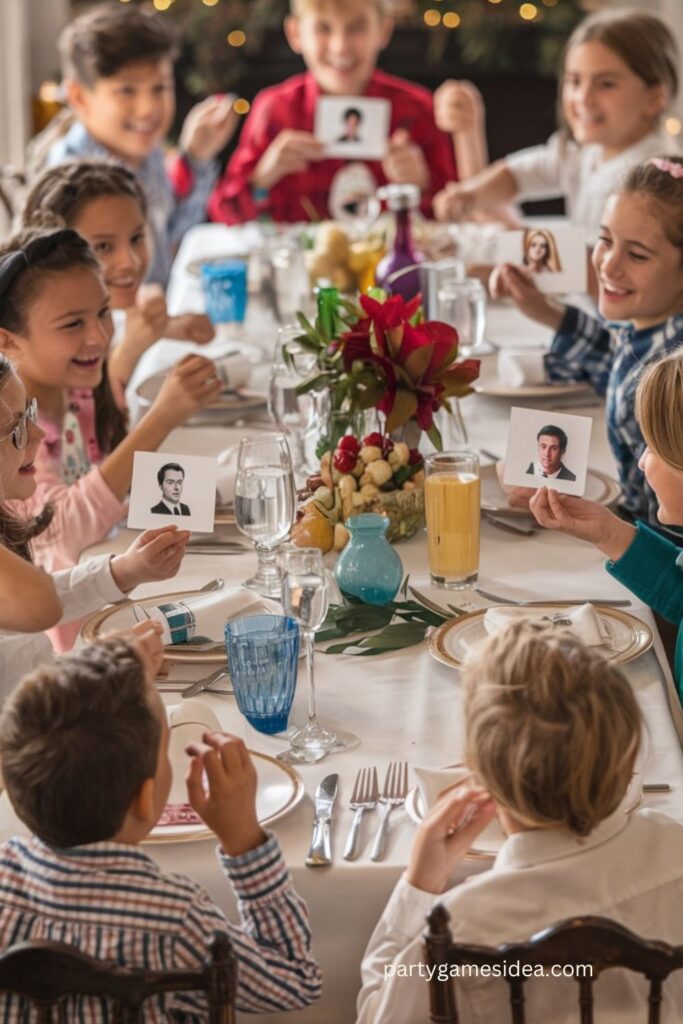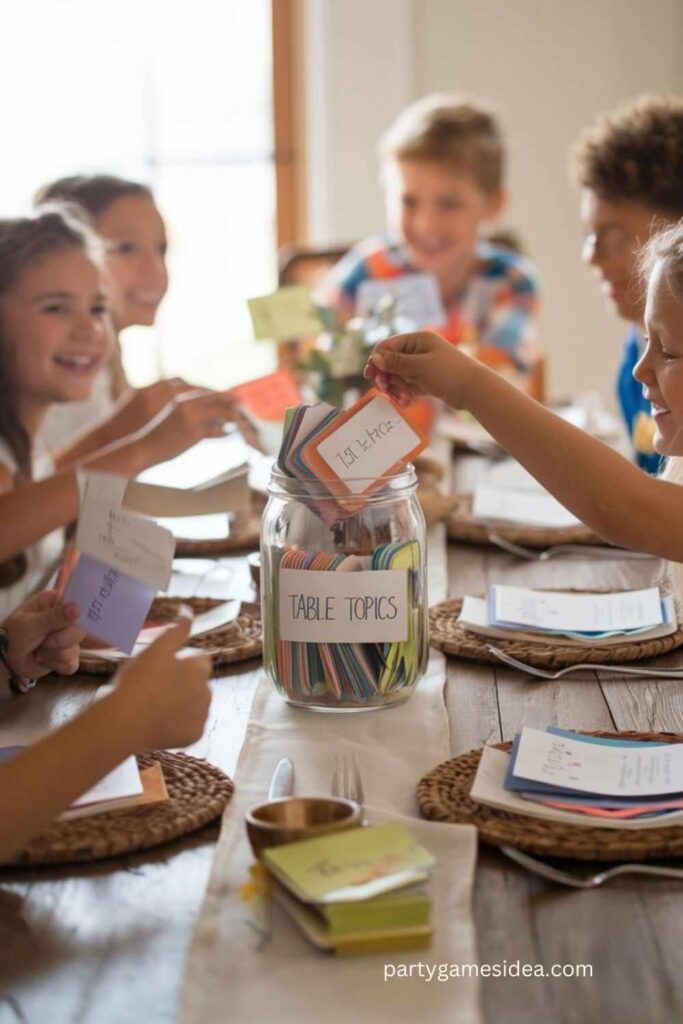Dinner Party Games at the Table are a fantastic way to bring energy and excitement to any gathering. Whether you’re hosting an intimate dinner with close friends or a larger social event, incorporating games into the meal can transform a standard dinner into a memorable experience. These games not only add an element of fun but also provide a natural way to break the ice, especially when guests may not know each other well. With laughter filling the room, the atmosphere becomes relaxed and lighthearted, creating a more enjoyable evening for everyone.
The purpose of incorporating Dinner Party Games at the Table is to encourage interaction among guests. They serve as perfect icebreakers, allowing people to engage with one another in a playful and entertaining way. Rather than relying solely on conversation to fill the evening, these games offer structured moments where everyone can participate. As the laughter grows, so do the connections between guests, making the meal more enjoyable and the party livelier.
Dinner Party Games at the Table
Dinner Party Games at the Table add a lively and interactive element to your gathering, transforming a regular meal into an engaging and memorable experience. These games encourage conversation, laughter, and connection among guests, making the evening more enjoyable. Perfect for breaking the ice and keeping the mood upbeat, they suit any group size and atmosphere.
Two Truths and a Lie Dinner Game
This classic icebreaker game is perfect for getting to know your guests better. Each person shares three statements about themselves—two true and one false. The rest of the table guesses which statement is the lie.
- Rules:
- Each guest takes turns sharing their three statements.
- Other players discuss and guess which statement is false.
- Tips:
- Encourage guests to come up with interesting or unusual facts to make the game more engaging.
- Keep the atmosphere light to avoid any awkwardness.
Guess the Person
A fun game that helps guests learn more about each other by guessing whose fact is being described. Write down interesting facts about each guest before the party, then reveal them one by one.
- Rules:
- Prepare facts about each guest and read them aloud.
- Guests guess who the fact belongs to.
- Tips:
- Choose facts that are intriguing but not too obscure.
- Allow guests to ask a few questions to narrow down their guesses.
Table Topics
This game uses conversation starter cards to keep discussions lively and engaging. Each card features a question or topic for guests to discuss.
- Rules:
- Pass around a set of Table Topics cards.
- Each guest takes turns drawing a card and reading it aloud.
- Tips:
- Use a variety of topics to cater to different interests.
- Encourage everyone to participate, but don’t force anyone to answer if they’re uncomfortable.
Would You Rather Dinner Game
A light-hearted game where guests choose between two amusing or challenging scenarios. This game is great for sparking conversation and laughter.
- Rules:
- Pose a “Would You Rather” question to the table.
- Everyone takes turns sharing their choice and explaining why.
- Tips:
- Prepare questions in advance to ensure a smooth flow.
- Choose questions that are appropriate for your guests.
Memory Chain
A memory challenge game where each person adds an item to a list and repeats all previous items. It’s a fun way to test memory and have a laugh.
- Rules:
- Start with a sentence like “At this dinner, I brought…”
- Each guest adds an item and repeats the list.
- Tips:
- Start with a simple list to ease into the game.
- Encourage creativity with the items listed.
Food Trivia
Test your guests’ knowledge of food-related facts with a trivia game. This can be a fun way to learn and share interesting tidbits about different cuisines.
- Rules:
- Prepare a list of food trivia questions.
- Ask questions to the group and keep score.
- Tips:
- Tailor questions to your guests’ knowledge and interests.
- Offer small prizes for correct answers to boost enthusiasm.
Alphabet Dinner Game
A simple yet entertaining game where guests name foods starting with each letter of the alphabet in sequence.
- Rules:
- Start with the letter “A” and go around the table.
- Each guest names a food starting with the current letter.
- Tips:
- Encourage quick thinking to keep the game lively.
- If someone hesitates too long, they’re out for that round.
Rhyme Time
A fun and fast-paced word game where players come up with rhyming words based on a given word.
- Rules:
- One person says a word, and others take turns finding a rhyme.
- The first person to hesitate is out for that round.
- Tips:
- Choose a word with multiple rhyming possibilities.
- Keep the pace quick to maintain excitement.
Who Am I Dinner Game
A guessing game where guests have sticky notes with famous names on their foreheads. They ask yes/no questions to figure out who they are.
- Rules:
- Write names on sticky notes and place them on guests’ foreheads.
- Guests ask yes/no questions to identify their assigned name.
- Tips:
- Use a variety of names to make the game interesting.
- Ensure everyone knows the rules clearly before starting.
Mystery Dish
Blindfolded guests taste small portions of food and guess what they’re eating. It’s a playful way to engage the senses and test taste buds.
- Rules:
- Blindfold one guest at a time.
- Serve them small samples of different dishes to guess.
- Tips:
- Use familiar foods to make guessing easier.
- Provide hints if guests are struggling too much.
Pictionary with a Twist
A drawing game where guests sketch clues related to the dinner, such as food items or famous chefs. It’s a creative way to add fun to the table.
- Rules:
- Write down themes related to the dinner on slips of paper.
- Guests draw the clues while others guess what they are.
- Tips:
- Keep drawings simple to ensure everyone can participate.
- Rotate the drawer to keep the game fair.
Charades: Food Edition
A classic charades game with a food twist. Guests act out food-related themes for others to guess, adding a humorous touch to the meal.
- Rules:
- Write down food-related prompts for charades.
- Guests take turns acting out the prompts without speaking.
- Tips:
- Choose prompts that are easy to act out.
- Encourage creativity and humor in the performances.
Pass the Present
A fun game where a wrapped gift is passed around the table while music plays. When the music stops, the person holding the gift unwraps it.
- Rules:
- Wrap a small gift and pass it around as music plays.
- When the music stops, the holder unwraps the gift.
- Tips:
- Choose a gift that’s light-hearted and fun.
- Play upbeat music to keep the energy high.
Napkin Folding Contest
Guests compete to create the most impressive napkin folds. It’s a simple game that adds a touch of elegance and creativity to the table setting.
- Rules:
- Provide napkins and folding instructions.
- Guests fold their napkins, and a judge picks the best design.
- Tips:
- Offer a few examples or tutorials for inspiration.
- Make sure everyone has enough time to complete their folds.
Tabletop Bingo
Create Bingo cards with various dinner-related items or actions. Guests mark off items as they occur during the meal.
- Rules:
- Prepare Bingo cards with items related to the dinner.
- Guests mark off items as they see or hear them.
- Tips:
- Include both common and unique items for variety.
- Offer small prizes for completed Bingo cards.
The Compliment Game
Guests take turns giving sincere compliments to others at the table. This game fosters positive interactions and makes everyone feel appreciated.
- Rules:
- Each guest gives a compliment to someone else at the table.
- Compliments should be specific and genuine.
- Tips:
- Encourage heartfelt compliments to enhance the atmosphere.
- Keep the game flowing by setting a time limit for each turn.
Name That Tune
Play short clips of popular songs and have guests guess the title or artist. It’s a musical game that gets everyone’s attention and adds energy to the dinner.
- Rules:
- Play snippets of songs from various genres.
- Guests guess the song title or artist.
- Tips:
- Choose a mix of old and new songs to appeal to everyone.
- Offer hints if needed to keep the game enjoyable.
Dessert Guessing Game
Guests taste a variety of desserts and guess the ingredients or flavors. It’s a sweet way to end the meal with a playful challenge.
- Rules:
- Serve small samples of different desserts.
- Guests guess the ingredients or flavors.
- Tips:
- Use a variety of desserts with distinct flavors.
- Offer clues if guests find it too difficult.
Recipe Swap
Guests share their favorite recipes with each other. This game not only provides new meal ideas but also sparks conversations about food.
- Rules:
- Each guest writes down a favorite recipe.
- Recipes are swapped and discussed around the table.
- Tips:
- Encourage guests to share unique or family recipes.
- Provide a way for guests to exchange contact information for further recipe sharing.
Foodie Fact or Fiction
Guests share food-related facts, and others guess if they are true or false. It’s an educational and entertaining game that fits well with a meal.
- Rules:
- Guests take turns sharing food facts.
- The rest of the table guesses if the fact is true or false.
- Tips:
- Prepare a mix of true and false facts to keep the game balanced.
- Offer additional explanations for educational value.
Dining Debate
Guests engage in light-hearted debates about various dining-related topics, such as favorite cuisines or cooking methods. It’s a fun way to spark conversation and laughter.
- Rules:
- Pose a dining-related question or topic for debate.
- Guests take turns sharing their opinions.
- Tips:
- Choose topics that are easy to discuss and not too controversial.
- Keep the tone friendly and humorous to avoid heated debates.
Foodie Bingo
Create Bingo cards with different food items or dining experiences. Guests mark off items as they occur throughout the meal.
- Rules:
- Prepare Bingo cards with various food-related items.
- Guests mark off items as they see or experience them.
- Tips:
- Include items related to the meal being served.
- Offer small prizes for completed Bingo cards.
Guess the Ingredient
A game where guests guess the secret ingredients in a dish. This adds a fun, culinary twist to the dining experience.
- Rules:
- Prepare a dish with unique or hidden ingredients.
- Guests taste and guess the ingredients.
- Tips:
- Choose ingredients that are distinct but not too obscure.
- Provide hints if guests find it too challenging.
Dining Trivia
Host a trivia game with questions related to dining, cooking, or food history. It’s an educational and engaging way to enhance the meal.
- Rules:
- Prepare trivia questions about food and dining.
- Guests answer questions and earn points.
- Tips:
- Mix easy and challenging questions to cater to different knowledge levels.
- Offer small prizes for correct answers to keep the game exciting.
Food Charades
Guests act out various food-related prompts for others to guess. This game combines physical activity with culinary themes.
- Rules:
- Write down food-related prompts on slips of paper.
- Guests draw a prompt and act it out without speaking.
- Tips:
- Choose prompts that are easy to act out but still fun.
- Encourage creativity in the performances to keep the game lively.
Guessing Games
Guessing games are a fantastic way to add fun and engagement to your dinner party. These games involve guests using their deduction skills, intuition, and often a touch of humor to solve a mystery or guess a hidden identity. They work well to break the ice, foster interaction, and keep the atmosphere light-hearted and entertaining.
Who Am I?
Write down the names of famous people—celebrities, historical figures, or fictional characters—on sticky notes. Stick one note on each guest’s forehead without them seeing it. Guests then take turns asking yes/no questions to figure out who they are.
- Purpose: This game is interactive and funny, as guests try to guess their assigned identity based on clues from others. It encourages conversation and laughter as everyone engages in the guessing process.
- Tips:
- Choose names that are well-known to ensure everyone can participate.
- Keep the questions to simple yes/no format to avoid confusion and maintain the game’s flow.
Mystery Dish
Blindfold one guest at a time and offer them small portions of different dishes. After tasting, they must guess the ingredients or the specific dish they sampled.
- Purpose: This game provides a fun challenge that engages the senses of taste and smell. It adds an element of surprise and excitement, making it a great way to end the meal on a playful note.
- Tips:
- Use a variety of familiar and unique ingredients to balance the difficulty.
- Provide hints if necessary, and ensure the blindfolded guest feels comfortable and enjoys the experience.
Drawing or Acting Games

Hi, I’m Hailey Say, the proud mom and owner of PartyGamesIdea.com. As a dedicated party designer and an expert in party ideas, I have a deep passion for crafting memorable and enjoyable experiences for every occasion. From holiday games to baby showers, bridal showers, bachelor parties, group gatherings, and more, I specialize in creating unique and fun party ideas that cater to all age groups and interests.
With an extensive collection of ideas ranging from printable games, teen and adult games, kids’ party activities, birthday party games, girls’ games, memory games, family games, and outdoor games, I aim to make every event special. My expertise also extends to themed parties such as dinner parties, brunch parties, graduation celebrations, college parties, and fun night games.
On PartyGamesIdea.com, I share my passion and creativity, helping people turn their party visions into reality. With years of experience and a keen eye for detail, I am committed to making your event planning process enjoyable and stress-free. Join me on PartyGamesIdea.com, and together, we’ll create unforgettable memories for you and your loved ones.










